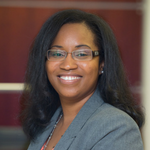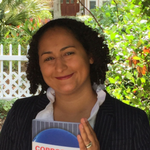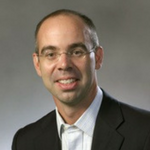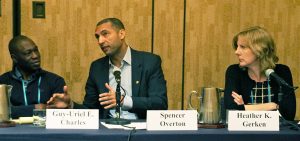Spotlight on Sections: Election Law
By Barbra Elenbaas
The Section on Election Law promotes the communication of ideas, interests, and activities among members and makes recommendations to the Association on matters of interest in the teaching and improvement of the law relating to election law, voting rights, campaign finance, and related topics.
We met with the leadership of the section in January 2017.

Chair: Franita Tolson, Florida State University College of Law

Chair-elect: Ciara Torres-Spelliscy, Stetson University College of Law

Immediate Past Chair: Michael J. Pitts, Indiana University Robert H. McKinney School of Law
The membership is inclusive. Election law is a broad topic that encompasses a number of disciplines: campaign finance, the Voting Rights Act,
et cetera. Mostly legal scholars come to the Annual Meeting, but we also attract people who have different training because politics implicates so many different substantive subjects as well. As we learned in the most recent election, elections matter—people are interested in hearing and learning about the implications of the rules that govern our electoral process and how they affect policy outcomes. Because of that, we have a wide draw. We will get political scientists, historians, and law professors who do not work in election law. We also have people who are just interested in the topic because of its far-reaching implications.
We have a diversity of scholars all under the broad umbrella of election law. I think that makes for good conversations and good programming.
Michael Pitts: We also have members who are interested in constitutional law issues. There is a huge intersection between election law and constitutional law particularly, for example, with the Equal Protection Clause.
Ciara Torres-Spelliscy: I tell my students that when the Supreme Court has an election law case on their docket, every American citizen is in that courtroom whether they know it or not. Anyone who happens to be interested in the future of American democracy should be interested in us.
Tell us about your program at the 2017 Annual Meeting—“Lessons from the 2016 Elections (and Implications for the Future).”
MP: It was an enormously wide-ranging discussion about the future of the election law field the larger political dynamic that currently exists in the United States and globally.
Our program was updated multiple times in the lead-up to the Annual Meeting. Many things that happened in the primaries seemed to get washed away by events that occurred in the second half of the year. Much of the discussion was about things that we didn’t even think would be an issue when we first submitted the program.
FT: Things were so crazy that I don’t know if we talked about the primaries at all.
MP: I don’t think we did.
FT: We had a conversation that I just didn’t expect to be having. I think people were attempting to take a step back and not be too alarmist. We re-worked the panel description a few times, given everything that happened in the six months between June 2016 and January 2017. It is a very interesting time to be doing this kind of work because election law has been a focal point for this president. For example, the 3 to 5 million people he claims voted illegally is something that he repeated several times in late-January. I think, by virtue of the fact that he is keeping attention on voter fraud, we will stay busy.
In terms of the national conversation around election law, how have you seen that change in response to the current administration? Looking ahead, how do you anticipate it will change?
FT: Prior to this election, people would assert that voter fraud existed but I don’t think anyone in the academy took such claims seriously. It was understood among legal scholars that there was very little evidence of voter fraud. I think now we are entering a situation where claims of voter fraud may push more states to adopt restrictive legislation and that will force scholars to confront this issue on a larger scale moving forward.
The section must engage the world as it currently exists. It is no longer enough to say that there is no such thing as voter fraud. We have to think about this from a different perspective because the President is pushing the narrative that he would have won the popular vote if not for illegal votes. Because this has become part of the national conversation, the section must respond.
MP: The conversation about fraudulent voting is shifting from a narrative about Democratic machines in big cities supposedly using in-person voter fraud as a means for winning elections to a conversation that now fuses voter fraud with the issue of illegal immigration. That fusion was always there in the background but it has, in my opinion, been ratcheted up in a very big way by President Trump.
CTS: It is a teachable moment for our students. They hear an unsubstantiated claim by the president, and I think all of us [on the call] are assuming that a real investigation of the actual election would find that somewhere, some single person voted twice. But it would be an asymptote approaching zero, which is the way it has always been. What’s most likely is that any investigation will not show what he thinks it will show. That is a teachable moment.
I haven’t seen this level of interest in the mechanisms of democracy since I was a student and
Bush v. Gore was happening. I see my own students deeply interested in how American elections function, including how the Electoral College determines who ultimately wins the White House, which is easy to gloss over if you hold the mistaken belief that the presidency is a national plebiscite—that’s not true. And I also have students who are deeply worried about voter suppression, restrictive voter ID laws, felony disenfranchisement, and gerrymandering. I get very detailed questions about reforms as well, whether it’s about the national popular vote movement, automatic voter registration, or campaign finance reform like public financing.
What was it like to be teaching election law in the classroom during this election cycle?
CTS: It makes for a lot of fascinating conversations, especially for the international students witnessing an election for the first time. They do not understand why we only have a two-party system. Most of my international students are used to multiple systems in a parliamentary regime. They also don’t understand blind loyalty to party, which they see manifesting itself in the American context. They don’t understand why we have the Electoral College and why we don’t already have the national popular vote.
What do you think has yet to play out? How do you think you will need to change the way you teach?
MP: What may be just as important down the line is the Supreme Court. Cases in front of the Supreme Court right now involve redistricting and racial gerrymandering. There are cases working their way up through the courts involving partisan gerrymandering. These may be significant developments for what’s heading down the line in 2020, the next redistricting cycle.
If we think back to 2010, focusing on redistricting seems to have helped the Republican party. I think the Democratic party is starting to wake up to that. The legal rules surrounding redistricting will shape how the districting plans in the states look.
CTS: And in terms of the Supreme Court, if you get someone whose beliefs on campaign finance are similar to those of Justice Scalia, then you are likely to see more deregulation of the rules that govern money and politics as well.
How has the recent election and the unpredictability of the new administration affecting your ability to do scholarship?
FT: I don’t think it affects the bottom line. Scholars have different approaches in how they write their scholarship. Personally, I just try to write and not worry about the politics surrounding my writing. I try to be objective. In my scholarship, I advocate for more people to have access to the ballot in a way that I believe is consistent with the constitutional text and history. Given that, it doesn’t matter who the president is relative to how I write, but this administration has seemed willing to be more aggressive in limiting access to the ballot. So of course, as a person who believes [voting rights] are important and whose scholarship reflects that, it makes me want to write more. If anything, this is motivation.
CTS: This is a time when election law scholars have a voice in the media. We get called by the fact checkers, and that is a great privilege. But it also takes time. I think you have to be able to walk and chew gum if you are teaching election law in the next couple of years.
MP: The greatest impact on my scholarship might be on the types of proposals I might espouse to try to fix problems. I will likely try to propose ideas that might get some traction with moderates, but also aim proposals at states and local governments as much as the federal government. Election law scholars have a tendency to focus on federal remedies, but the best place for new ideas may be state legislatures, state courts, and local bodies.
CTS: Some of the movement in reforming money in politics is happening through local initiatives like innovation in public financing in Seattle and ethics reform in Tallahassee (the city itself, not the state of Florida, which has a way to go when it comes to election reform).
How do your section members interact and collaborate outside of the AALS Annual Meeting?
FT: There are several conferences throughout the year that Election Law members attend. For example, here at Florida State we had a conference last February to talk about the 50
th anniversary of the Voting Rights Act. It is pretty common for section members to have conferences throughout the year, and you will see a good number of those involved in the section at that conference.
MP: For two out of our last three Annual Meetings, we have published papers that have come from our panels with the
Election Law Journal, which is a peer-reviewed journal. Those papers come from members of the Election Law section but because of the peer review there are also interactions outside the AALS Annual Meeting relating to the publication of those pieces. Then, presumably, they are digested by our membership as well, even those who could not make the Annual Meeting and hear the presentations.
How does your section support the scholarship of your members? What does your section do to recognize new scholars and/or particularly great scholarship from longtime members?
FT: We are a fairly new section, but one of the things we will start this year is a “best election law paper from a new scholar” award. We decided on this for a couple of reasons. First, so the more senior people in the field have the opportunity to know who is up and coming. They are the people who’ll write tenure letters, after all. The other reason is to give young people who are doing cutting-edge scholarship a vehicle to publicize their work. We are looking forward to using it as an opportunity to build a bridge between older generation scholars and the younger generation, and give young people a medium in which they get their ideas out there for tenure.
What improvements to law school curricula have you seen as a result of the work of your section? How have you seen it change during the time you’ve been teaching?
FT: The field actually isn’t that old. Election law as a distinctive topic didn’t gain traction until after the 2000 election. After that, there was a proliferation of textbooks. We started seeing more classes in law schools, and there arose a focus on developing election law as its own field. I view forming our own section as part of standing on our own feet and not being considered a part of constitutional law or legislation.
CTS: Part of that follows on the litigiousness of election lawyers. Before
Bush v. Gore, it wasn’t clear that the Supreme Court would hear a recount, especially of the presidential election. But I think once they did, Pandora’s box was open. It opened up the idea that you could litigate some issues that were previously viewed as either administrative or as non-justiciable political questions.
How do you structure your section? Do you have an executive committee and/or other internal structure, such as internal committees or working groups?
FT: We have an executive committee with seven members including secretary, treasurer, the chair-elect, and the chair. We do not have any sub-committees. It’s a very collaborative section, and we are so small that we have had no need for sub-committees. It has worked well for us.
MP: We have the maximum number of executive committee members, which I think demonstrates the interest that is out there for our section. There is no shortage of people who are willing to be a part of it.
What is your vision for the section, this year and in the years to come? What new initiatives, project-based or ongoing, would you like to see as part of the section?
FT: I want to increase the turnout at our programs. Attendance has already been quite good, especially since we were given an 8:30 a.m. slot this past meeting. We had a packed room. It shows the level of interest in things we’re talking about and working on. I hope, in coming years, you will see our attendance increase especially given the interest with the current administration.
I think it would be nice, because election law is such a broad umbrella, to mix it up on the panel. We could have a good mix of experts with political scientists and law professors. I would like to see more cross- and interdisciplinary cooperation with programming for the section.
MP: At some point, I would like to see the section focus more on teaching election law. How can we be better at teaching election law? How can election law fit into a broader law school curriculum?
CTS: Election law is both great and frustrating because it changes almost daily as courts make rulings and legislators change the rules of the game. That makes it a thrilling part of the law to teach. I hope our section can continue to be a source of accurate information for not just the scholars in our own field but all our fellow citizens.
I am always surprised at who cares about this area. I recently had two different conversations—one was a group of veterans who were passionate about “amend[ing] the Constitution to address
Citizens United” and the other group was environmentalists who were worried that the impact of money and politics is impeding the ability of our elected officials to accept factual science. As I said before, when the court tackles these issues, they can have an impact on the entire nation. Part of what attracted me to the field in the first place is that you can use all of your brain and some of your heart when you are practicing election law.

Election Law panel at the 2017 AALS Annual Meeting



